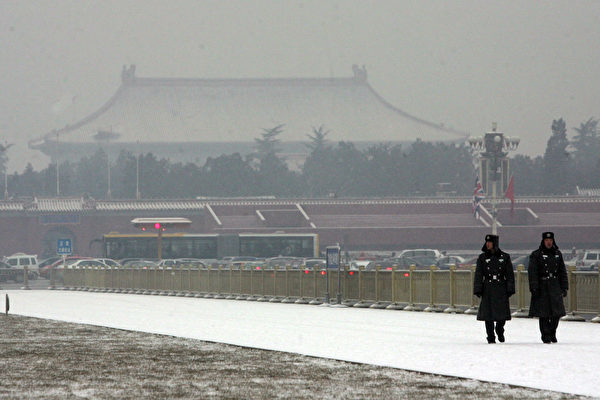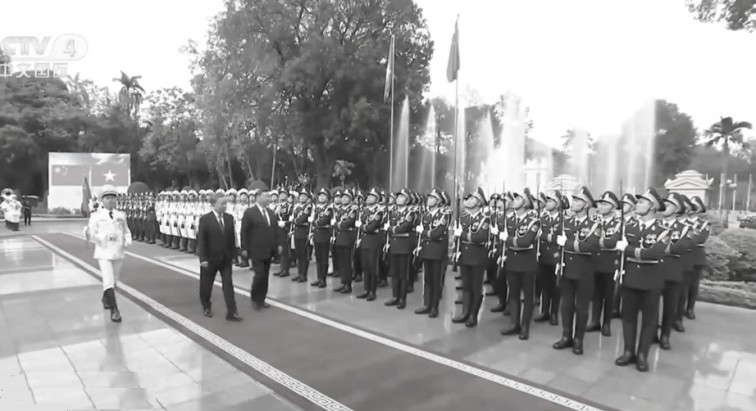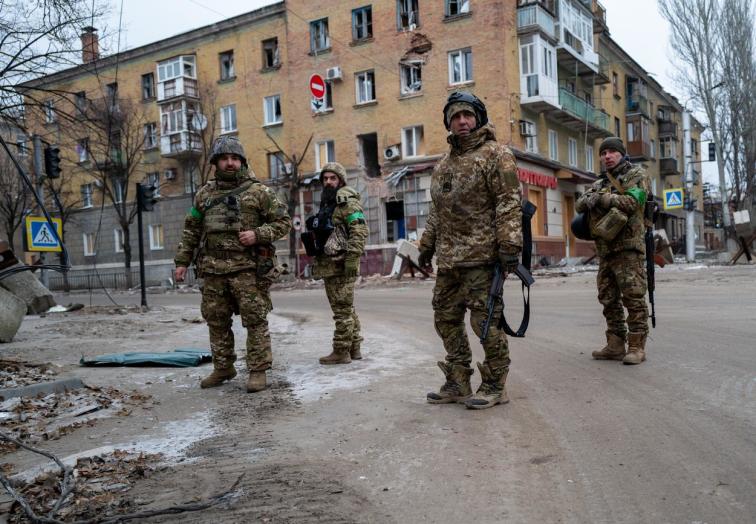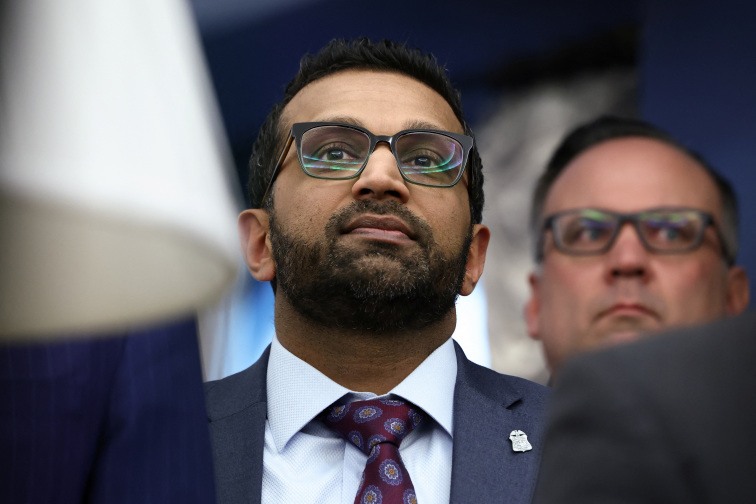Chinese paramilitary police stand guard at Tiananmen Square. (China Photos/Getty Images)
[People News] While Xi Jinping visited Malaysia accompanied by Cai Qi, Wang Yi, and Wang Xiaohong, China’s state media announced on April 16 a new round of State Council personnel appointments and dismissals. Among them, Li Chenggang replaced Wang Shouwen as China’s Vice Minister of Commerce and International Trade Representative; Chen Xiaodong was removed from his position as Vice Foreign Minister and appointed as the new head of the China International Development Cooperation Agency, replacing Luo Zhaohui; Xu Ganlu was dismissed as Vice Minister of Public Security and Director of the National Immigration Administration (Entry-Exit Bureau), and was succeeded by Wang Zhizhong.
Among the four removed, only Chen Xiaodong received a new appointment. The remaining three have had no follow-up news and have been scrubbed from official websites, raising questions of whether they were “forced into retirement” or had fallen from grace. Particularly notable are Xu Ganlu and Wang Zhizhong, both seen as close to Public Security Minister Wang Xiaohong.
Xu Ganlu, born in 1962 and originally from Fujian, spent much of his career in the Xiamen public security system. During Xi Jinping’s tenure as Xiamen’s Deputy Mayor, Xu served as Director of the Kaiyuan District Public Security Bureau, and later became Xiamen’s Deputy Police Chief and Party Secretary of Huli District. In 1994, Xu was transferred to Beijing as Deputy Director of the Ministry of Public Security’s Entry-Exit Administration, and two years later, promoted to Director. In 2009, he became Deputy Director of the Public Security Ministry’s Logistics Bureau and later Director of the Traffic Management Bureau.
In 2015, two years into Xi’s leadership, Xu was parachuted into Henan Province as Vice Governor and Police Chief, replacing Wang Xiaohong, who was transferred to Beijing as Police Chief. Xu was then promoted to the rank of Deputy Minister and member of the Henan Provincial Standing Committee and head of the Political and Legal Affairs Commission. In 2018, he was appointed Deputy Minister of Public Security and became the first Director of the newly established National Immigration Administration. In August 2023, Xu succeeded Wang Xiaohong as President of the Chinese Police Association.
Xu’s career rise can be split into two phases. His 2015 promotion likely came from Xi Jinping’s favor rather than Wang Xiaohong’s. His initial 1994 transfer from Xiamen to Beijing, however, was likely orchestrated by someone else, as Xi was still in Fujian and had yet to rise to national prominence.
In 1999, Xiamen was rocked by the massive Yuanhua smuggling scandal involving Lai Changxing. Over 600 officials were implicated, including almost the entire local customs staff and many government officials. Around 300 faced criminal charges. Among them were then Deputy Minister of Public Security Li Jizhou and Deputy Head of Fujian’s Public Security Bureau Zhuang Rushun. The investigation stopped abruptly when it reached Li Jizhou, as Lai Changxing was backed by powerful figures like Jiang Zemin’s personal aide Jia Ting’an and Politburo Standing Committee member Jia Qinglin.
In 2001, an online leak claimed that Xu Ganlu—already working in Beijing—was taken in for questioning by the CCP’s disciplinary body in connection with the Yuanhua case. Allegedly, it was Li Jizhou who helped Xu secure his position in Beijing. Ultimately, Xu escaped punishment, but without a strong patron, his career stalled—until Xi’s rise, when Xu likely reconnected with Xi and became part of his inner circle.
As for Xu’s ties to Wang Xiaohong, the two did not work directly together in Fujian—Xu was in Xiamen, Wang in Fuzhou. They may have known each other professionally, but likely weren’t close. Once Wang began his rapid ascent under Xi, Xu benefited from his own connections with Xi and was appointed to Wang’s previous position in Henan. Three years later, Xu joined the Public Security Ministry, becoming Wang’s subordinate. Whether their relationship deepened remains unknown, but both were clearly aligned with Xi.
Now, at age 63, Xu’s removal—especially following recent investigations into Xi’s military allies such as He Weidong, Miao Hua, and Lin Xiangyang—raises speculation: is this another case of senior party figures targeting Xi’s loyalists?
Turning to Wang Zhizhong, who replaced Xu Ganlu: born in 1965, he entered the public security system in 1986. He served in various roles, including Director of the Office of the Public Security Ministry’s Guard Bureau, Deputy Director of the Bureau, Deputy Director of the Special Service Bureau, and Party Deputy Secretary. In 2021, he was appointed Vice Governor of Guangdong Province, Chief of Police, and First Deputy Secretary of the Provincial Political and Legal Committee. After two years of local experience, he returned to Beijing as Deputy Minister of Public Security and simultaneously took over as Party Secretary and Director of the Special Service Bureau—a position previously held by Wang Xiaohong. This indicates a high level of trust from Wang, as the bureau is responsible for the security of top CCP leaders.
Logically, if Xi’s confidants are being cut down by veteran party figures, then Wang Xiaohong and his associates would also be under threat. Yet here we have one deputy minister (Xu) removed while another (Wang Zhizhong) is promoted—leaving outsiders perplexed. What’s really going on here?
It is noteworthy that Xu Ganlu, besides having a superior-subordinate relationship with Wang Xiaohong at the Ministry of Public Security, also has a separate connection with Xi. In contrast, Wang Zhizhong, who has served long in the Ministry of Public Security, does not have a clear factional background; he is likely to have been favored by Wang Xiaohong due to his exceptional professional skills, and he has no direct ties to Xi. Following this line of reasoning, Xu Ganlu's dismissal is likely intended to weaken Xi's influence.
So, will Wang Xiaohong also follow Xu Ganlu's path? This likely depends on his loyalty to the party leader. If he remains loyal, his fate is clear. But is this truly the case? I wonder if everyone remembers that after the news of the party leader's stroke surfaced following the Third Plenary Session last July, Wang Xiaohong and other senior officials displayed several unusual behaviors.
First, after the plenary session, on July 19 of last year, the Ministry of Public Security's website reported on the study and implementation of the spirit of the Third Plenary Session, and it was peculiar that not a single mention of Xi Jinping or Xi Thought appeared in the entire article, which sharply contrasts with previous reports that always included Xi.
Secondly, on October 15 of last year, Wang Xiaohong visited Tianjin to investigate the service and support for high-quality economic development, stating, 'We must effectively align our thoughts and actions with the scientific judgments and decision-making of the Party Central Committee, promoting the continuous recovery and improvement of the economy...'. It seems rather odd that a Minister of Public Security would discuss the economy, express concern for people's livelihoods, and yet not mention Xi, doesn't it?
Despite the Ministry of Public Security adding some loyal phrases regarding Xi Jinping and certain loyalists after drawing external attention, the report on "Police Day" published on January 10 this year only mentioned the Communist Party leader once. Throughout the rest of the report, there was no further mention of Xi, nor were there any standard loyalty phrases like "establishing and maintaining" associated with "2442". Such omissions would not have occurred in the reports celebrating Police Day in 2024 and 2023.
There are reports suggesting that as early as after Xi's stroke, Wang Xiaohong had already aligned himself with the new "Party Central", which explains why he downplayed Xi's supremacy in his statements following the incident. Wang Zhizhong, who oversees security, likely played a role in this shift, and his promotion is viewed as a "reward". The defector Wang Xiaohong is unlikely to regain Xi's trust, and the apparent "harmony" is merely a façade.
This article is reprinted from the Dajiyuan website.








News magazine bootstrap themes!
I like this themes, fast loading and look profesional
Thank you Carlos!
You're welcome!
Please support me with give positive rating!
Yes Sure!